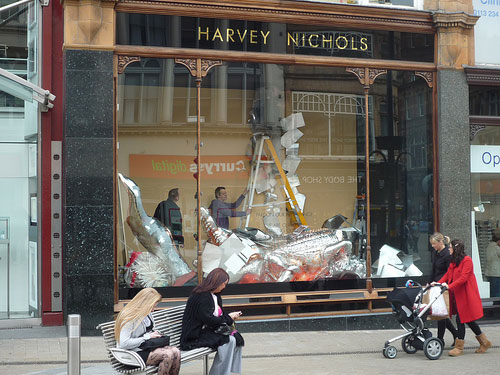The past few years have seen many big names on the High Street close down. Chains such as Comet, HMV, Borders, Virgin have all been victims to the recession and competition from online retailers.

I was listening to a radio debate following the closure of HMV and some young girls said that usually when shopping, they went to the high street, tried on clothes, and then went home to order them online. This gives shoppers the best of both worlds. They get the enjoyment of the actual shopping experience (looking at and trying on clothes), and then they get the benefit of being able to buy the goods cheaper from the internet.
This doesn’t just happen for clothes and record companies, but many high street stores. People like browsing through the store, but then go home and buy from the internet.
The problem is – how long will we be able to enjoy the best of both worlds? If shoppers increasingly window shop on the high street but buy online, high street shops will continue to close down to be replaced by charity shops, pound shops, cafes and those rather soulless mini city centre supermarkets.
If you asked most people whether they would like their bookshop and record shop to be replaced by another mini Tescos or Poundlandshop, I’m sure most people would choose to have the old fashioned shops. But, do we like them enough to keep buying and paying more expensive prices – when we could save a few pounds buying online?
There is a free-rider problem involved in buying from High street shops. We want to be able to have the opportunity to browse these shops, but we’d prefer it if other people do the buying, and we get to enjoy the browsing for free and buying online.
If we see an expensive book in Waterstones and go home to buy at Amazon, we got the enjoyment of finding the book in the bookshop but also got to save £5. We could have bought the book in Waterstones and paid a premium, but it’s not going to make any difference to the survival of Waterstones. The best is if we leave it to other people to buy the expensive books, then we get the best of both worlds – being able to browse a high street bookshop and save £5 buying online.
This creates a free rider problem – the incentive to leave it to other people to buy the more expensive books on the high street. If everyone buys online, the high street bookshop closes and society loses out. But, because of the free-rider problem, we don’t have the incentive to buy ourself.
You might think is a bookshop such as socially important good? Does it really matter if we buy music and books from the internet? Am I not being a luddite in preferring to have more expensive older technology? Who can fight against change? Didn’t bookshops put out of business all those monks writing scrolls by hand?
This is from a personal view. Personally, my favourite high street shop by far is a good book shop. Fortunately, in Oxford, we still have two major bookshops – Blackwells and Waterstones. I would be willing to pay a premium of a few pounds to retain bookshops in city centres. I wouldn’t want to see them close down. But, there is also a contradictory thought. If I know I can get a book £10 cheaper online, why waste money in the shop?
It’s a dilemma, which I kind of muddle through. I buy some books online, I buy some from the bookshop. There is part of me, which gets a certain amount of utility from buying in a bookshop. The ability to interact with a bookseller rather than a computer. The hope that this is helping to save Blackwells survive rather than being taken over by Poundland. So this helps to justify paying a few pounds more.
When it comes to CDs, I don’t get too romantic. I stopped buying CDs a few years ago – so I really didn’t mourn the passing of HMV (even though I have fond memories of buying my first Record in the mid-1980s. I’m less proud of the record choice Kylie Minogue, ‘I should be so lucky’ but that’s another story). But, with books, I do feel much greater attachment. I definitely feel a city centre without a decent bookshop would be a poorer place.
But, the market place is not founded upon sentiment alone. Will people be willing to overcome the free-rider problem, and actually buy from the High Street or will we become good old capitalists and always buy the cheapest options?
One thing is certain, the High Street in ten years time will look very different. But, I do hope it isn’t just pound shops and Tesco Metros.
Related

It sounds to me as though this trend will ultimately favour the development of shops run directly by manufacturers selling proprietary goods, rather than the general stores we have been used to. The problem faced by e.g. Waterstone’s is that they sell goods also available (and more cheaply) elsewhere, whereas Top Shop (for example) mainly sells clothes which can only be bought from them. So it will be worthwhile for Top Shop to continue running stores, even if most of their customers end up buying online. But the function of shops like Waterstone’s may eventually be better served by shops run by major publishing houses (Penguin, Bloomsbury, Collins etc) or conglomerations of them. Indeed, something a bit like that seems to be happening with HMV, in that record labels are recognising the value to them of customers being able to browse their products in real life, and stepping in to try to save the chain.
thanks good point.
Libraries can replace the bookshop. Free rider overcome and libraries fulfill their purpose.